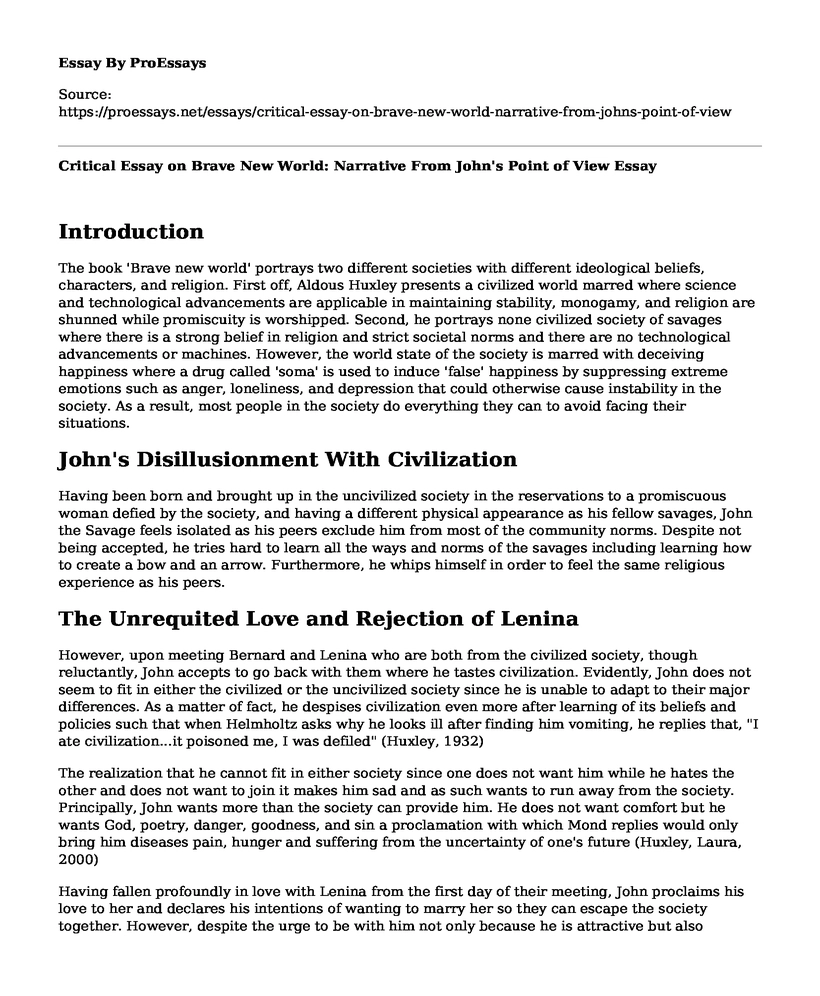Introduction
The book 'Brave new world' portrays two different societies with different ideological beliefs, characters, and religion. First off, Aldous Huxley presents a civilized world marred where science and technological advancements are applicable in maintaining stability, monogamy, and religion are shunned while promiscuity is worshipped. Second, he portrays none civilized society of savages where there is a strong belief in religion and strict societal norms and there are no technological advancements or machines. However, the world state of the society is marred with deceiving happiness where a drug called 'soma' is used to induce 'false' happiness by suppressing extreme emotions such as anger, loneliness, and depression that could otherwise cause instability in the society. As a result, most people in the society do everything they can to avoid facing their situations.
John's Disillusionment With Civilization
Having been born and brought up in the uncivilized society in the reservations to a promiscuous woman defied by the society, and having a different physical appearance as his fellow savages, John the Savage feels isolated as his peers exclude him from most of the community norms. Despite not being accepted, he tries hard to learn all the ways and norms of the savages including learning how to create a bow and an arrow. Furthermore, he whips himself in order to feel the same religious experience as his peers.
The Unrequited Love and Rejection of Lenina
However, upon meeting Bernard and Lenina who are both from the civilized society, though reluctantly, John accepts to go back with them where he tastes civilization. Evidently, John does not seem to fit in either the civilized or the uncivilized society since he is unable to adapt to their major differences. As a matter of fact, he despises civilization even more after learning of its beliefs and policies such that when Helmholtz asks why he looks ill after finding him vomiting, he replies that, "I ate civilization...it poisoned me, I was defiled" (Huxley, 1932)
The realization that he cannot fit in either society since one does not want him while he hates the other and does not want to join it makes him sad and as such wants to run away from the society. Principally, John wants more than the society can provide him. He does not want comfort but he wants God, poetry, danger, goodness, and sin a proclamation with which Mond replies would only bring him diseases pain, hunger and suffering from the uncertainty of one's future (Huxley, Laura, 2000)
Having fallen profoundly in love with Lenina from the first day of their meeting, John proclaims his love to her and declares his intentions of wanting to marry her so they can escape the society together. However, despite the urge to be with him not only because he is attractive but also because sleeping with him would improve her image in the society, Lenina refuses his proposal since she is a civilized young woman who does not believe in marriage but only in sex. As a result, she tries to persuade him to stay by sexually seducing him. To her dismay, her attempts to kiss or have sex with him are met by a hostile, ferocious John who pushes her away while calling her a 'whore'. His refusal to have sex with Lenina is reflected in his strict moral code to which (Huxley, 1932) writes that John is obedient to laws that had since stopped functioning and is tied to strong vows that had never been inexistent.
Conclusion
In light of his strong religious belief, John feels dirty and barbaric for giving it to his sexual desires with Lenina. He also blames himself for Linda's death and feels that he never loved her enough. As a result, he retreats to a secluded lighthouse where he could be alone and pray. The pain of losing Lenina 'the love of his life' hurts him and he ends up whipping her and finally hanging himself to escape from all the struggles of his life.
Works Cited
Huxley, Aldous. "Brave new world. 1932." London: Vintage (1998).
Huxley, Laura Archera. This timeless moment: A personal view of Aldous Huxley. Springer Science & Business, 2000.
Firchow, Peter Edgerly. The End of Utopia: A Study of Aldous Huxley's Brave New World. Bucknell University Press, 1984.
Cite this page
Critical Essay on Brave New World: Narrative From John's Point of View. (2022, Mar 25). Retrieved from https://proessays.net/essays/critical-essay-on-brave-new-world-narrative-from-johns-point-of-view
If you are the original author of this essay and no longer wish to have it published on the ProEssays website, please click below to request its removal:
- Personal Perception of Doctor Victor Frankenstein
- Glenn Altschuler "All Shook Up: How Rock 'n' Roll Changed America" Essay
- Importance of Lebert Joseph to Avey Johnson in Praisesong for the Widow
- David Sedaris' Welcome to French Class Critical Analysis Essay
- Specimens of Bushmen Folklore Paper Example
- The Legend of Sleepy Hollow Summary and Analysis Essay
- Essay Example on Life's Crossroads: Making Difficult Decisions







